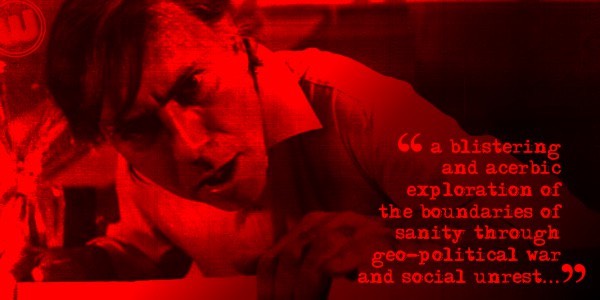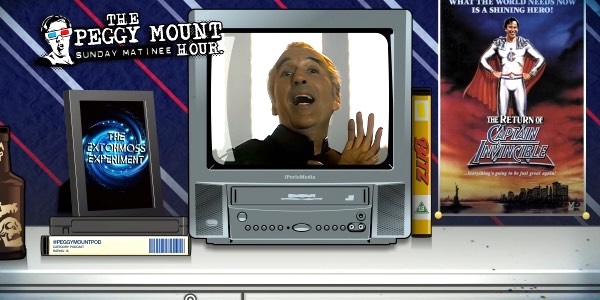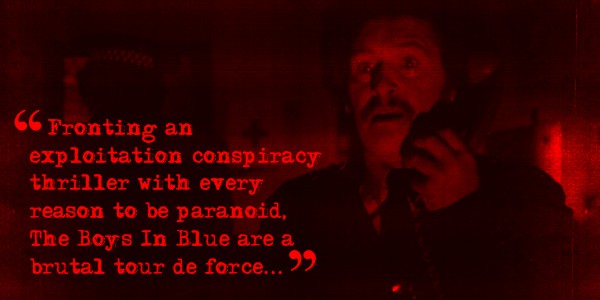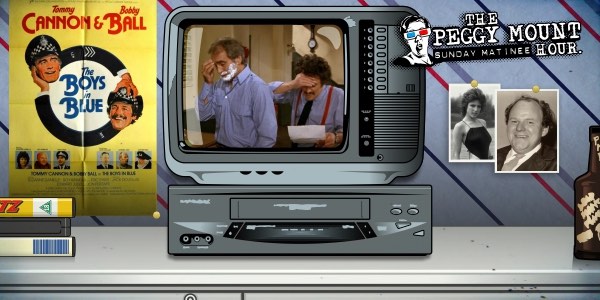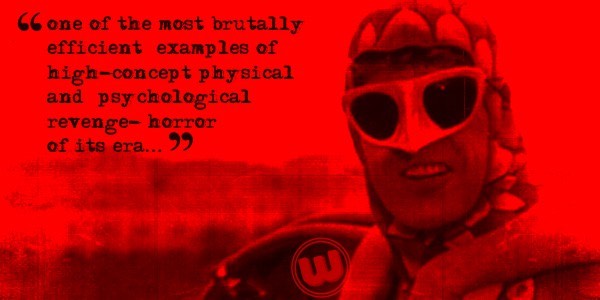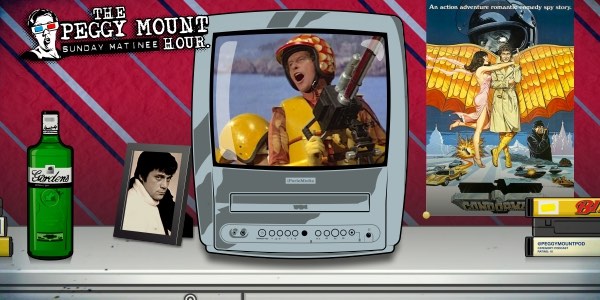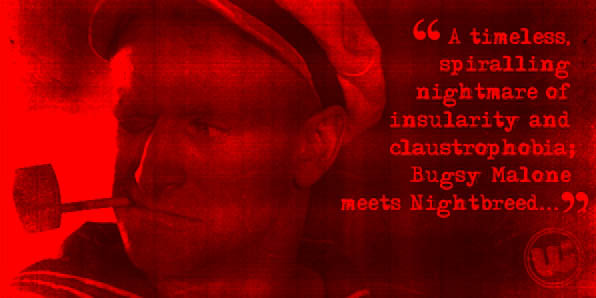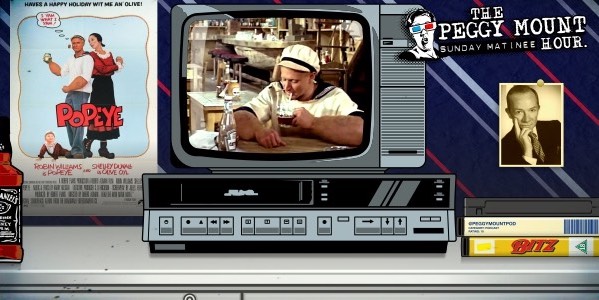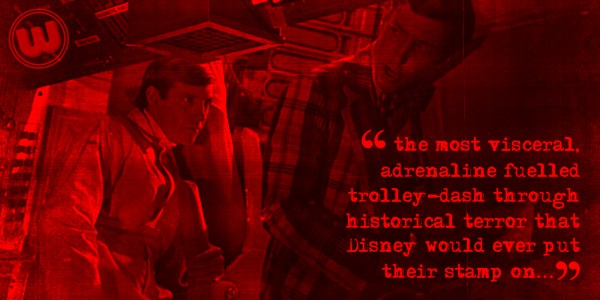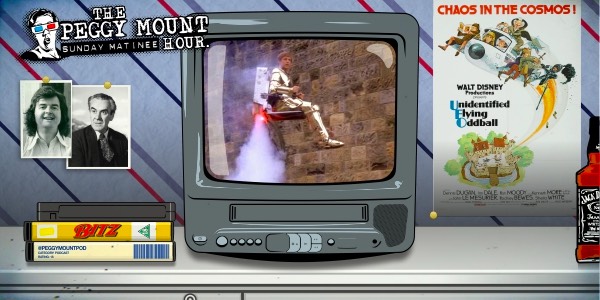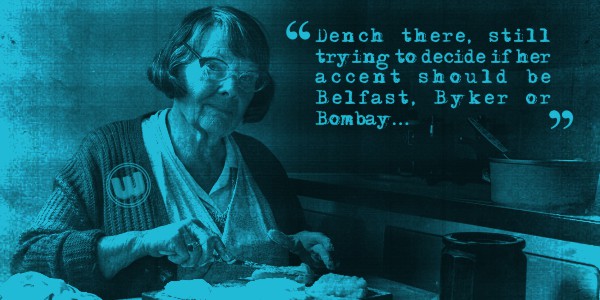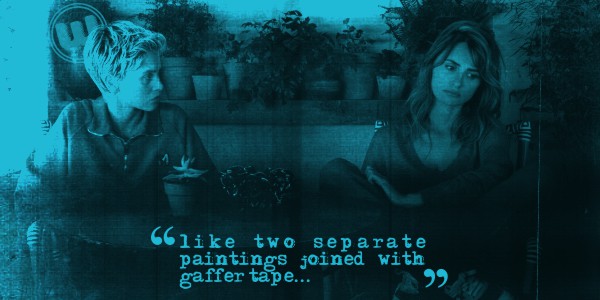
Ugh. 2022.
The apparent knock-on of The Dark Times is that global film production is still in absolute flux, thanks in no small part to online-streaming having knocked distribution into a cocked hat. I'm not saying that all the best stuff's going direct to the small screen, because from my (admittedly undocumented) experience, that's clearly not the case either.
My year began with good intentions of course, as most do. The usual ongoing cinema-reviews were going to be supplemented with catch-up pieces from home, and I'd even pick back up on my list of Can't Believe I Haven't Seen classics. Didn't fucking happen of course, since February's customary despondency fell in lockstep with the frankly 'challenging' standard of newly-released entertainment, with studios veering wildly between 'brainless crowd pleaser for crowds which still aren't there' and 'we're putting this out because even Netflix wasn't interested in throwing money into promoting it as new'.
It's not that all new films are crap.
I'm saying that seem to I care far less about them either way.
That said, my creative energies have been diverted a little (as you are possibly aware from the social-feeds of this site). The retro-TV podcast which I co-host goes from strength to strength, and a short sub-series on movies back in May/June created crossover-posts where I'd write here about them as well. Whereas the audio shows lovingly take the piss out of these celluloid gems, the written versions re-imagine them in a far darker light.
But I digress. This post is is a belated catchup on what I actually watched at the cinema. I only clocked 50 visits this year, the least number of times I've been since 2010. And hand-on-heart, this isn't just down to the choice on offer; I have resolutely refused to spend time sitting in front of movies which did not appeal from their trailers - precisely the kind of movies I'd previously have gone to see as a matter of course. If a trailer doesn't do the job of selling the film to me (the only job it has), I very much doubt I'd be surprised by the final product. Because of this, there's nothing below about Avatar, Uncharted, Three Thousand Years Of Longing, Black Adam, Secrets Of Dumbledore, Rise of Gru, Mrs Harris Going To Paris, Morbius, Strange World, Prey For The Devil and definitely nothing on the cultural fucking atrocity that appeared to be Ticket To Paradise. These might all be marvellous of course, it's my loss in not knowing.
Anyway, here's what I managed to get myself to the pictures for, that I didn't write about here...
THE FILMS
Licorice Pizza
Paul Thomas Anderson, 128m
I'm not a scholar of PTA, so the only thing I was impressed with here was his minute attention to detailing the most unlikable characters at the centre of his own film. Technically exquisite, emotionally excruciating...
Nightmare Alley
Guillermo del Toro, 150m
Like a beautifully-filmed episode of Hustle where there's no intricate twist anywhere to be found. Blanchett's femme-fatale character is so overplayed she's basically a cartoon. GDT is better than this.
Death On The Nile
Kenneth Branagh, 121m
Okay this was always going to be a hard-sell with me as I adore both the Ustinov and Suchet versions, but Branagh ditches half the characters, does nothing with the rest and assembles a cast so bland to tell the story that the world would be a better place if he just hadn't bothered. I mean, who hires French & Saunders and then utterly wastes having French & Saunders on-set? And the moustache doesn't need an origins-flashback, you tool.
The Batman
Matt Reeves, 176m
Very decent stuff. Not my sandpit to play in, but I enjoyed this thoroughly. Loved the performances, and only felt let down by the simplistic pay-off to Riddler's character arc and the screenwriting genius of protecting Gotham's city folk from flooding by herding them into a building which is beneath ground-level. This film works best as a one-off, standalone snapshot, so naturally DC are going to make more...
Phantom Of The Open
Craig Roberts, 102m
Sunday afternoon film. Great cast, decent scripting and solid performances, but can't overcome the hurdle of its own tweeness.
The Duke
Roger Michell, 95m
Was on standby for eye-rolling levels of cinematic saccharine, but found this surprisingly enjoyable due to it having a properly crafted storyline.
The Unbearable Weight Of Massive Talent
Tom Gormican, 107m
If you think the idea of Nicholas Cage playing Nicholas Cage in a movie about Nicholas Cage is exciting, innovative or hilarious, you are going to love this movie. I mean it's basically fine, but the central conceit wears thin pretty quickly, and after that it's just another Ferrell/Wahlberg action comedy with a different label. Consistently entertaining, but far too in love with itself.
Operation Mincemeat
John Madden, 122m
A timely reminder for us here in Blighty that the winning team in the Second World War achieved victory despite having some unlikable arseholes in its ranks, not because of that. Madden's film is too playfully throwaway for Saturday night historical-drama territory and too introverted and acidic for Sunday afternoons. Not a total loss, but the cast are lost with a script still in its second-draft.
The Lost City
Aaron Nee, 112m
An all-star action rom-com, written in caps-lock and painted in neon? Yeah, I was surprised I loved it as well. The cast are committed, this never takes itself seriously and is a better film for that. An unexpected highlight of the year.
The Northman
Robert Eggers, 131m
Takes itself too seriously. Visually dark and tonally linear. Eggers is better than this (The VVitch, The Lighthouse), although I suspect his cast really aren't...
Sonic The Hedgehog 2
Jeff Fowler, 122m
Like a lot of movies, this sequel could never re-capture what made its predecessor a pleasant, lightning-in-a-bottle surprise. It's fine; check-the-boxes, straight-to-video fare which is only intended for an audience who are into spotting Easter-eggs over an actual story...
Doctor Strange In The Multiverse Of Madness
Sam Raimi, 121m
The closest the MCU have/will come to making an outright horror flick. There are pacing, plotting and performance issues and I loved this anyway. Certainly the best it could possibly be without Scott Derrickson at the helm, but a beautiful continuation of his 2016 work.
Everything Everywhere All At Once
Daniels, 139m
Not feeling the love for this. Some moments of audience-baiting genius (subtitled rocks), but spends far too much time being pleased with itself for an arthouse mashup of Brazil and Jet Li's The One...
Men
Alex Garland, 100m
Nice filmmaking, shame about the story. The performances and visual crafting here are outright beautiful, just don't expect the screenplay to have any meaning other than what's ham-fistedly reeled out in its final moments.
Doctor Strange In The Multiverse Of Madness
Sam Raimi, 121m
Back to this one for a second-pass (a rarity this year), revelling in Raimi's revelling in the undead.
The Black Phone
Scott Derrickson, 99m
Very strong performances (this, from someone who usually detests Ethan Hawke) and visual design, and a weirdly flawed narrative where one half of it is compelling and the other is utterly needless other than changing the scenery. Should probably have written about this because I have issues with the aspects which are holding back what should be a great movie. Is this really what Derrickson bailed out of Doctor Strange for..?
Thor: Love & Thunder
Taika Waititi, 114m
Despite the chronic mis-casting of Christian Bale bringing DC energy to a Marvel character and wondering why his performance falls flat on its arse, I absolutely loved this. Okay it hasn't got the flow of Ragnarok, but I don't think anyone realistically expected it to. And yet I didn't go back and see this again during its run, unheard of for Legacy-Marvel. Suspect that has more to do with me in 2022 than the film, though.
Bullet Train
David Leitch, 121m
Film of the year, there I said it. It's messy, it's too long and it's not sure who its main character is supposed to be, but Bullet Train is very bright, very fast and very silly. Like Guy Ritchie directing a Deadpool movie. Full ruddy marks.
Nope
Jordan Peele, 125m
Maybe it's a first-world problem to expect a movie from a provenly-brilliant writer/director to have a coherent narrative and structure, but Nope is a mish-mash of interesting ideas which haven't been developed properly, dumped out in this form because no one at the studio had the cojones to tell Peele to go back and fix it. If this film had come from any other director it would have been utterly roasted, and deservedly so.
Bullet Train
David Leitch, 121m
This was still on, so why wouldn't I go and see it again? Joyous.
Fisherman's Friends: One And All
Meg Leonard / Nick Moorcroft, 112m
Better than it has any right to be and nowhere near good enough to have been green-lit in the first place. The soundtrack is still superb, the scenery is still gorgeous, but that's not enough the second time round.
Nope
Jordan Peele, 125m
Just to make sure. Yeah, I was sure the first time.
Bodies Bodies Bodies
Halina Reijn, 90m
Okay my comparative-pool is smaller than most this year, but this is hands-down the worst film on the list. 94 minutes of mumbling, shrieking and hand-held cameras in the dark. A couple of interesting shots, but I'm actually slightly impressed with how relentlessly awful it is.
The Invitation
Jessica M. Thompson, 101m
Hammy, overcooked, and features some of the very worst British Person Dialogue Written By Someone Who Is Not British™ you have ever heard. But it's got the fun swagger of a decent mid-90s vampire romp. I've certainly seen far worse.
Top Gun
Tony Scott, 111m
First time I'd seen this since the late 80s, first time ever in a cinema. And I don't care what people say, Top Gun is a demonstrably bad film. Deplorable characters, next to no story, just a series of loud events for the best part of two hours while people who like the sound of engines tell themselves they're fans of cinema now. Seriously, I almost walked out...
Top Gun: Maverick
Joseph Kosinski, 131m
...which is why I was so surprised when I enjoyed this immediately afterward. The characters are still cardboard at best, and the fixation with afterburners and destroying what's left of my low-frequency hearing still remains, and the story (such as it is) is basically the Death Star trench-run, but I had fun with this. I'll never intentionally watch it again, but I had fun.
Fall
Scott Mann, 107m
Beautifully shot, well assembled but appallingly written. Fall should have ended after 25 minutes with a Wilhelm Scream. All I'm saying is, this film was better when it was an episode of Bottom.
Bullet Train
David Leitch, 121m
Yes, again.
Hatching
Hanna Bergholm, 87m
As social, coming-of-age metaphors go it's incredibly on the nose, and structurally far from perfect. But for sheer bloody-minded, pent-up, what-the-fuckery Hatching is very solid.
See How They Run
Tom George, 94m
Wes Anderson-lite, and there's something missing in the 'togetherness' of the film as a whole, but it's satisfying and entertaining enough for casual fans of Agatha Christie.
Jaws
Steven Spielberg, 124m
Yeah, it's not great. Sure it's iconic an'all, and obviously worked better for a 1975 audience, but I found the characters to be almost entirely one-note in a story which is grindingly linear. I say this because I know for a fact that the novel has layers which just aren't represented here. Yeah, this and Top Gun. It's almost as if 'a shark' and 'a plane' aren't quite enough for me on their own...
Smile
Parker Finn, 115m
A few superb performances fail to save this social-horror involving a tag based curse which takes seven terrifying-vision-filled days to kill its victim. Well done guys, you've invented The Ring a mere 24 years, 1 reboot and 8 sequels after it already existed.
The Lost King
Stephen Frears
Sunday afternoon. It's fine. Nothing to disappoint, nothing to shock, exactly what you expect. If anything, it's Sally Hawkins I feel sorry for, this is all on her CV...
Halloween Ends
David Gordon Green, 111m
Solid cinematography and a few nice set-pieces, but this is a tonal car-crash of a movie. Narratively and emotionally incoherent, this feels like it's been directed by three people, none of whom have met one another.
The Banshees Of Inishirin
Martin McDonagh, 109m
Intriguing and bleak in equal measure. At one point I was literally crying with laughter, and by the end I was expecting the cinema staff to be handing out leaflets for Dignitas. Wouldn't go so far as to say I enjoyed this, but I certainly appreciated the fuck out of it.
Black Panther: Wakanda Forever
Ryan Coogler, 161m
Torn between acting as an industry-tribute to Chadwick Boseman (which it does very well, when it remembers), and dragging out a b-list story with badly chosen characters and GCSE moralising (I think you can tell how that goes). To be fair, this entertained me all the time it was on and as soon as I stepped out into the foyer I knew I didn't need to watch it again. Also, no post-credits scene: what the fuck, Marvel? Don't get all 'sombre and respectful actually' after a movie where you had the gall to bring the atrocious Sub-Mariner on to the stage...
Confess, Fletch
Greg Mottola, 95m
By no means perfect (more a series of sketches than an actual narrative), but very entertaining in an old-school, disposable, 1980s action-farce kind of a way.
The Menu
Mark Mylod, 107m
Plays like a Shyamalan movie at every single turn, until the crescendo when you realise the twist is that the film is going to do exactly what it said it would. For this reason: decent.
She Said
Maria Schrader, 128m
The template for this 'January Oscar-Bait movies for people who love current affairs but apparently don't watch the news' outing is tried and tested now, but I'll happily admit I was surprised by how fucking good this is. Always justly furious, never preaching or condescending. A masterclass in social filmmaking.
Living
Oliver Hermanus, 102m
Yes it's twee, yes it's meandering, yes it plays like a cinematic mood-board rather than a story, but Bill Nighy raises his game above autopilot and just about saves this.
Bones And All
Luca Guadagnino, 125m
Weirdly decent considering how much the director and the cast seem determined to not let the audience enjoy the story or any of its players. Too drab for a horror, too visceral for a YA drama, but its compelling characters make this worth a watch.
Violent Night
Tommy Wirkola, 112m
Sure, it's an r-rated Home Alone and the storyline is average at best, but Wirkola and his cast embrace the live-action slapstick in a way that's impossible not to enjoy. And the absolute, nailed-on stroke of genius that makes this really work is that the film remains committed to Santa being real throughout (which of course, he is).
The Muppet Christmas Carol
Brian Henson, 89m
Fully restored version, remastered and with When Love Is Gone back in there. This very well may be the single greatest film of all time, and bear in mind I say that as someone with three Star Wars tattoos and none of The Muppets...
The Silent Twins
Agnieszka Smoczynska, 113m
It's not every true-story that's got the balls to haphazardly show its unintelligibly dialogued protagonists as inherently unlikable. Awful. Then because there's no story, there's no ending - the film just finishes as things stop happening. Absolute scenes, although it's still nowhere near as bad as Bodies Bodies Bodies.
Nocebo
Lorcan Finnegan, 97m
Solid performances from the central cast crumble as soon as the film cack-handedly telegraphs that it's going to half-inch the sweatshop subplot from that shit Steve Coogan film. Everything afterward is precisely what it deserves to be.
The Pale Blue Eye
Scott Cooper, 128m
Languorously pacing proves to be this film's greatest ally, as a story that's just on the right side of batshit-crazy builds the atmosphere of paranoid hyper-reality required to make it work. A lovely mood-piece for the cold winter months, this will be largely (and wrongly) overlooked.
THE CONCLUSION
Whatever. 2022 has felt - overall - grindingly average, and my heart goes out to the cinema industry when this is all they've got to attract customers to spend money. I haven't cancelled my Unlimited card, but this is the first year I've thought very seriously about it on more than one occasion. Other than Indiana Jones, there are currently no 2023 movies which I'm actually excited about seeing. And I'm not ready to bin this blog off completely yet (if I was, it'd all just disappear), but I need to formulate a quicker way of writing about movies. This is the one aspect of blogging which I've got worse at over the years, with my obsession over formatting outweighing spontaneous efficiency.
I'd like to say reviews are going to pick back up, but that's precisely the sort of thing I always come out with at the end of December. Let's see. No promises, no regrets.
Let's all just agree to never do 2022 again...
DISCLAIMERS:
• ^^^ That's dry, British humour, and most likely sarcasm or facetiousness.
• Yen's blog contains harsh language and even harsher notions of propriety. Reader discretion is advised.
• This is a personal blog. The views and opinions expressed here represent my own thoughts (at the time of writing) and not those of the people, institutions or organisations that I may or may not be related with unless stated explicitly.

